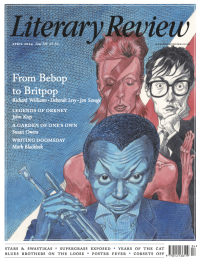Clare Mulley
For King & Suffrage
Jack and Eve: Two Women in Love and at War
By Wendy Moore
Atlantic Books 400pp £22
Had Wendy Moore been writing a novel, she could hardly have invented more fabulous leading characters than Vera ‘Jack’ Holme and Evelina ‘Eve’ Haverfield or have set her narrative in a time of greater drama. It was ‘grand living in the midst of history like this’, one of Jack and Eve’s colleagues wrote in Petrograd in 1917, after a year of war service and in the face of revolution. This was the spirit that sustained these determined and resourceful women as they carved out places in a world hostile to those who seemed to delight in upsetting social convention.
As a young woman, Eve was pretty and privileged, an outdoorsy aristocrat who enjoyed riding, shooting and hiking in the Highlands. The daughter of a baron, raised in a castle, she had, Moore says, ‘always lived life on a grand scale’. Aged nineteen, she exchanged touring the world with her parents for travelling as the wife of an army officer. Eight years and two children later, the day after her first husband’s funeral, Eve set off again, this time alone. When exploring the Americas failed to satisfy her, she returned to Britain and married another officer being deployed overseas, confirming her taste for military life.
While Eve was seeing the world, Jack, fourteen years younger, was touring Britain’s flea-ridden boarding houses as she worked as a music hall entertainer. She had been born in Lancashire and the early death of her timber merchant father had left her with few socially acceptable options, none of

Sign Up to our newsletter
Receive free articles, highlights from the archive, news, details of prizes, and much more.@Lit_Review
Follow Literary Review on Twitter
Twitter Feed
Alfred, Lord Tennyson is practically a byword for old-fashioned Victorian grandeur, rarely pictured without a cravat and a serious beard.
Seamus Perry tries to picture him as a younger man.
Seamus Perry - Before the Beard
Seamus Perry: Before the Beard - The Boundless Deep: Young Tennyson, Science, and the Crisis of Belief by Richard Holmes
literaryreview.co.uk
Novelist Muriel Spark had a tongue that could produce both sugar and poison. It’s no surprise, then, that her letters make for a brilliant read.
@claire_harman considers some of the most entertaining.
Claire Harman - Fighting Words
Claire Harman: Fighting Words - The Letters of Muriel Spark, Volume 1: 1944-1963 by Dan Gunn
literaryreview.co.uk
Of all the articles I’ve published in recent years, this is *by far* my favourite.
✍️ On childhood, memory, and the sea - for @Lit_Review :
https://literaryreview.co.uk/flotsam-and-jetsam